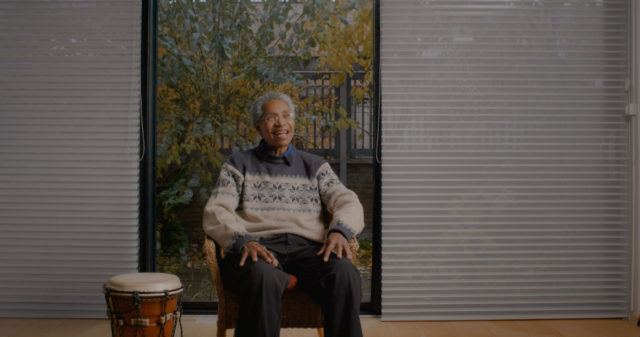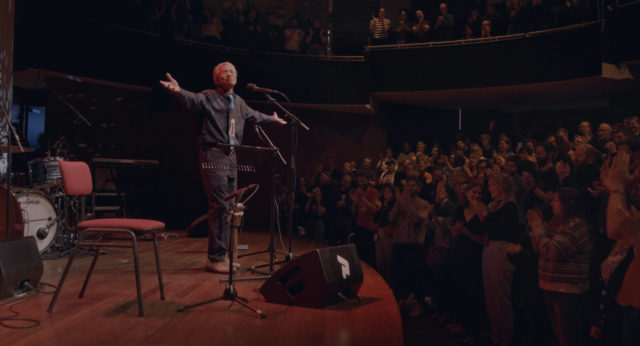
Beverly Glenn-Copeland discusses his life and career in Keyboard Fantasies
KEYBOARD FANTASIES (Posy Dixon, 2021)
Roxy Cinema Tribeca
2 Sixth Ave.
Opens Friday, October 29
www.roxycinematribeca.com
www.keyboardfantasies.movie
“I just lived my life,” Philadelphia-born Canadian composer and Black trans activist Beverly Glenn-Copeland says in the documentary Keyboard Fantasies, opening October 29 at the Roxy in Tribeca. The seventy-minute film follows the now-seventy-seven-year-old musician as he plays several shows after having been rediscovered in 2015, which led to the rerelease of his 1986 album, Keyboard Fantasies, a work that melds ambient, jazz, classical, folk, world, and New Age sounds in a way that was ahead of its time. Obsessed with Glenn-Copeland’s music, director Posy Dixon became Skype friends with him and ended up making her debut feature film.
Dixon cuts back and forth between live performances and Glenn-Copeland sitting on a chair in his house, discussing his life, accompanied by family photographs and home movies. Both of his parents were pianists; when his mother became a Quaker, she decided that Glenn-Copeland, then known as Beverly, needed to be fixed. “Her protective instinct was that I should be as normal as possible. Well, I wasn’t like that,” he says.

Beverly Glenn-Copeland basks in his rediscovery in Keyboard Fantasies
Born in 1944, Glenn-Copeland went to McGill University in Canada, where he felt targeted and isolated, unhappy in his body. “I was having to fight quite a lot to be able to be just who I was,” he recalls. He left school, bought a guitar, and started writing music. It took decades before he realized he was trans, including a disastrous stint as a lesbian and the parental threat of electroshock therapy. In 2016, he got an email from a Japanese collector, requesting copies of Keyboard Fantasies. It wasn’t long before Glenn-Copeland was out on the road, playing gigs with the young band Indigo Rising, consisting of Jeremy Costello, Carlie Howell, Kurt Inder, Nick Dourado, and Bianca Palmer, who are seen in the film hanging out with him and performing onstage together. “He’s completely out of time and place always,” Dourado says affectionately.
Dixon travels with Glenn-Copeland and Indigo Rising to the Scribe Center in Philly, the Barbican Centre and Café Oto in London, TivoliVredenburg and Le Guess Who? in the Netherlands, the Jam Factory in Toronto, and other venues, where he plays such meditative songs as “Sunset Village,” “Complainin’ Blues,” “Color of Anyhow,” “Ever Anew,” “Let Us Dance,” “La Vita,” and “Wade in the Water.” (The last tune is the one Glenn-Copeland sings on an eighty-four-foot diaphanous curtain hanging from the top of the Guggenheim Museum in the recent exhibition “Wu Tsang: Anthem.”)
The documentary focuses on Glenn-Copeland’s search for personal identity and his music career; there are no experts or critics chiming in, we don’t get to meet his wife, Elizabeth Paddon, and he doesn’t talk about adding “Copeland” to his name in honor of American composer Aaron Copland. In addition, the film was made before Glenn-Copeland had to cancel a tour because of the pandemic lockdown just as his career was being fully revived and he and Paddon had to resort to a GoFundMe page to avoid homelessness.
But it’s all part of his journey. “I don’t believe there’s any mistakes in our lives,” he says. The positivity of Glenn-Copeland’s outlook is infectious, even when it comes to a bad joke that appears after the closing credits.